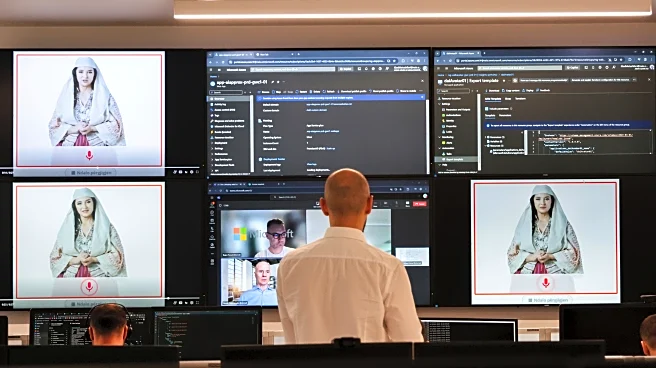What's Happening?
The New Development Bank (NDB), established by BRICS countries in 2015, is marking a decade of operations. Initially created as an alternative to Western-dominated financial institutions, the NDB has expanded
its membership beyond the original BRICS nations—Brazil, Russia, India, China, and South Africa—to include Bangladesh, the United Arab Emirates, Egypt, and Algeria. The bank's mandate focuses on mobilizing resources for infrastructure and sustainable development projects in emerging economies. Despite challenges such as the COVID-19 pandemic and sanctions against Russia, the NDB has approved 112 projects worth $37 billion. The bank aims to balance shareholder interests with international financial influences, planning operations worth $30 billion by 2026.
Why It's Important?
The NDB's expansion and operational strategies are significant as they represent a shift towards a multipolar economic order, challenging traditional financial systems. By broadening its membership and diversifying its project portfolio, the NDB enhances its global influence and provides emerging economies with access to financing for strategic projects. This expansion could lead to increased economic stability and growth in member countries, offering an alternative to the conditionalities imposed by institutions like the IMF and World Bank. The bank's focus on local currency financing aims to strengthen capital markets in member countries, potentially reducing reliance on the US dollar.
What's Next?
The NDB plans to continue expanding its membership and operational reach, with Uruguay in the process of joining. The bank's strategy includes increasing local currency financing to 30% of total operations by 2026, which could enhance its impact on capital markets across member countries. As the NDB navigates geopolitical tensions and financial challenges, its ability to maintain an independent stance regarding external sanctions will be crucial. The bank's focus on sustainable and resilient infrastructure projects positions it as a key player in promoting green development and social inclusion.
Beyond the Headlines
The NDB's operations highlight the complexities of balancing geopolitical interests with financial strategies. While the bank aims to reduce dollar dependency, its current practices still involve significant dollar-denominated transactions. The NDB's governance and transparency issues, along with its reliance on sovereign projects, suggest areas for improvement. As the bank continues to expand, its role in transforming global financial systems and promoting inclusive development will be closely watched.









